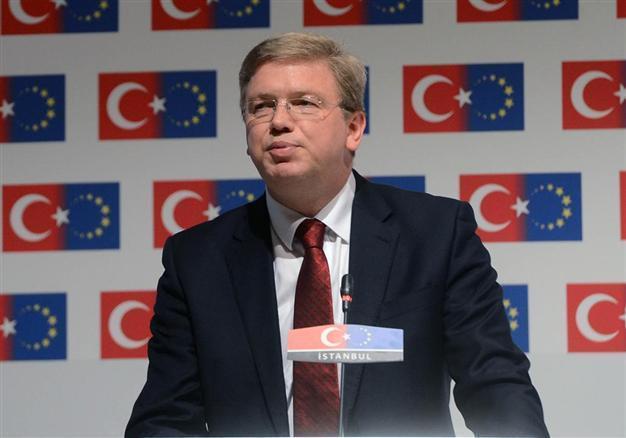Turkish media's 'poor coverage' of Gezi protests slammed at EU Conference
BRUSSELS – Hürriyet Daily News

European Commissioner responsible for enlargement, Stefan Füle, speaks at a conference. AA photo
The traditional Turkish media’s poor coverage of police crackdowns on mass demonstrations in Turkey, in contrast to social media’s pivotal role, has repeatedly come up for discussion during a conference organized by the European Commission on freedom of expression and media in the Western Balkans and Turkey.The deafening silence of the mainstream media in the first days of the recent protests in Istanbul and in other places and the worrying use of police actions against the media only serve to underline how much this conference is needed, Stefan Füle.
Strong democracy is a prerequisite for membership, and freedom of expression is one of the main pillars of democracy, according to Füle, who added that the state of the media provided an accurate index for the state of freedom of expression.
He stressed there was a direct link between freedom of expression and the accession process. While he briefly mentioned self-censorship in Turkey, he also praised recent judicial amendments regulating the conditions according to which journalists can face imprisonment.
Turkish news channels have received more criticism for not providing coverage of demonstrations in Istanbul and instead choosing to broadcast documentaries about penguins, this time from Fergus O’Dowd, the Irish minister of state.
“It is clear that by choosing not to report, broadcasters end up being sidelined and citizens go elsewhere,” he said, addressing a conference on freedom of expression and the media in the Western Balkans and Turkey.
As a result of the poor coverage in the early days of the demonstrations, social media has played a pivotal role in the organization of organizers and provided information to the wider world, said O’Dowd.
The demonstrations show that Turkey is in transition and that the space for civil society is widening, which is largely due to the reforms of EU accession process, he said. Even pro-government journalists were able to expresses their criticism about the response to the demonstrations, according to the minister from Ireland, which currently holds the presidency of the 27 nation bloc.
Meanwhile, Member of the European Parliament Jery Buzek also talked about Turkey in his opening speech, making particular reference to Prime Minister Recep Tayyip Erdoğan’s description of social media as a “troublemaker.”
“When TV and radio do not report police brutality against demonstrations, you know something is wrong,” Buzek said. “We should be worried about this.”
Dunja Mijatovic, the OSCE Representative on Freedom of the Media, recalled that 60 journalists were currently in prison in Turkey. While recalling the argument of the Turkish government that these were not in prison because of their journalistic activities, she expressed amazement at the fact that a great majority of them were facing terrorism charges. She also drew attention to the fact that 30,000 websites were blocked in Turkey.
















